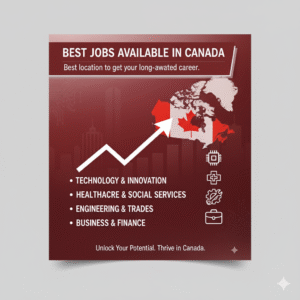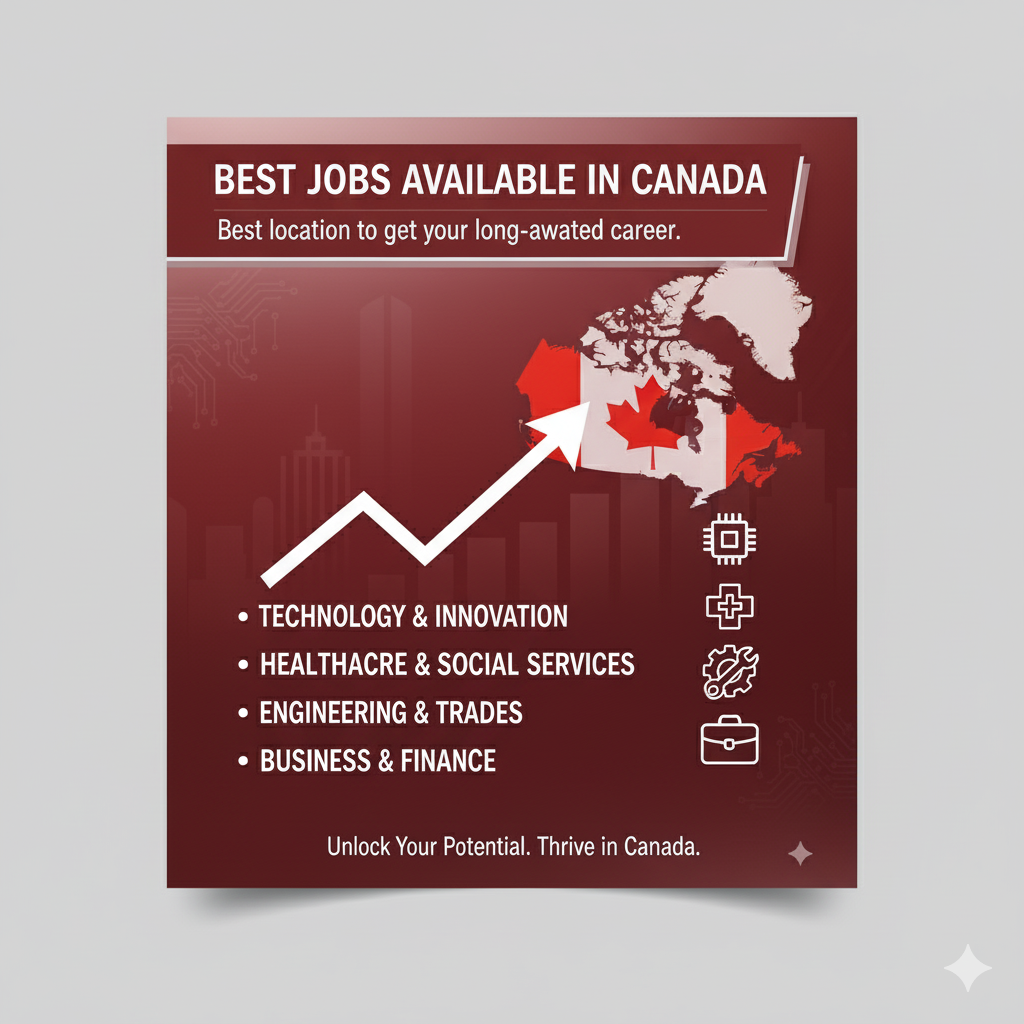If you’re exploring jobs in Canada, this blog post is designed to serve as a practical roadmap, one that helps you understand the current employment landscape, identify in-demand sectors, prepare effectively, and navigate the application process. Whether you’re in the United States, UK, or elsewhere, this guide will walk you through key considerations and actionable steps.

-
Jobs in Canada?, why it remains the best job choice for you
Canada’s labor market remains a significant draw for international candidates. For example:
- The national unemployment rate in March 2025 stood at around 6.7%.
- Employment growth has been above pre-pandemic averages, signaling ongoing demand for labor.
- Some reports suggest there are over 1 million job vacancies in Canada across multiple provinces in 2025–26.
These facts suggest that, while the market is competitive, opportunities do exist — especially if you prepare well.
-
Where the Jobs Are: Key Provinces & Regions
Not all Canadian job markets are equal, so it’s helpful to target the right regions.
- Provinces like Ontario, British Columbia, and Alberta frequently show higher job-vacancy levels.
- Regional snapshots indicate, for instance, that the Toronto economic region’s unemployment rate rose to 9.5% in one recent period, meaning that metropolitan areas may have more competition.
- On the other hand, certain smaller regions or less-dense provinces may offer less competition and good opportunities.
Tip: Focus on provinces with greater demand in your field, and research provincial immigration/job-pathway programs if you’re coming from overseas.
Read also: List of the Highest Paying Jobs in Canada: How and Where to Apply for one

-
What Industries & Occupations Are Hiring
Understanding what kinds of jobs are in demand gives you a strategic edge. Here are some of the key sectors:
- Skilled trades and construction: The federal government highlights strong demand in “skilled trades” (e.g., carpenters, electricians) due to waves of retirements and housing/construction activity.
- Business, finance, insurance, and professional services: Hiring in these areas has been strong for 2025 in Canada. 
- Technology and natural/applied sciences: Although more competitive, these are growth areas.
Action step: Match your skills (or skills you are willing to develop) with one of these demand areas. If you can bridge a gap (e.g., take a short course, get certification), you’ll be better placed.
-
Understanding the “Department of the Vacancy” Concept
When you see a job posting in Canada, one way to think of it is: “Which department or part of the employer is offering this vacancy?” Understanding this can help align your application more effectively.
For example:
- If a job posting is from a government or public-sector employer, the “department” might be Finance, Human Resources, Engineering, IT, etc.
- If it’s from a private company, the department could be Operations, Sales & Distribution, Logistics, Customer Service, etc.
- Being clear about the department helps you tailor your résumé, your cover letter, and speak precisely to how your experience or skills would support that part of the organization.
Why this matters:
Recruiters often scan for keywords tied to the department, e.g., “Finance & Insurance (F&I) department”, “Manufacturing operations department”, “Trade & Construction department”. If your documents mirror that language, you increase your chances of being noticed.
-
Application Strategy for International / Overseas Applicants
If you’re applying from Nigeria (or elsewhere outside Canada), here are important points to navigate:
- Work permit/visa status: Most employers in Canada require a valid work permit or evidence that you’re eligible to work. The national job-bank site states that “If you are not legally authorized to work in Canada, you can’t apply for every job.”
- Résumé and cover letter: Adapt your résumé to Canadian standards, concise (ideally 2 pages max), clear structure, highlight relevant skills, and quantifiable achievements. Tailor it to the department offering the job.
- Translate/explain local experience: If your experience from Nigeria has transferable skills (e.g., finance, customer service, trades), make that explicit.
- Use Canadian job-boards: Websites like Job Bank are useful for spotting vacancies and understanding job-market language.
- Network: Consider using LinkedIn or Canadian professional groups. If you know someone in Canada (even remotely), ask for informational conversations.
- Prepare for remote interviews/time zones: Be ready for virtual interviews and adjust for Canadian time zones.
- Budget for relocation/lifestyle: Research the cost of living, accommodation, and whether the job covers relocation assistance (if applicable).
Here’s a practical checklist you can follow:
- Identify 2-3 target provinces or cities (based on demand in your field).
- Choose your top 1–2 sectors/departments (e.g., Finance Department in Insurance; Skilled-Trades in Construction Department).
- Update résumé and cover letter, focusing on the department’s terminology and key skills required.
- Research work permit/visa requirements and ensure your eligibility.
- Register on Canadian job boards such as Job Bank, LinkedIn Canada, and sector-specific boards.
- Apply consistently, aim for 5–10 quality applications per week rather than dozens of generic ones.
- Prepare for interviews by researching Canadian workplace culture (e.g., punctuality, clear communication).
- Follow up your applications (a polite email 1 week after if you haven’t heard back).
- If you get an offer, check the contract, salary, benefits, and relocation thoughtfully.
7. Common Mistakes to Avoid
Here are pitfalls many international applicants fall into and how to avoid them:
- Applying to every job broadly (“spray and pray”) instead of focusing on selected roles matching your profile.
- Résumés not tailored to generic résumés get overlooked because they don’t speak the employer’s language.
- Ignoring the “department” angle, employers want to see how you’ll fit into that team or department.
- Not researching the cost of living, some Canadian cities are expensive; know what you’re signing up for.
- Assuming a work permit is automatic, make sure you’re eligible before spending too much energy on applications
-
Final Thoughts
Landing a job in Canada is entirely achievable — but it requires strategy, preparation, and the right mindset. By focusing on where the jobs are, which departments are hiring, and aligning your skills accordingly, you’ll be far better positioned than someone who simply sends out dozens of generic applications.